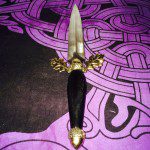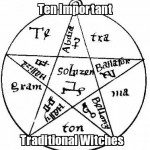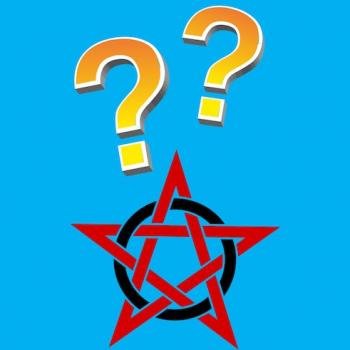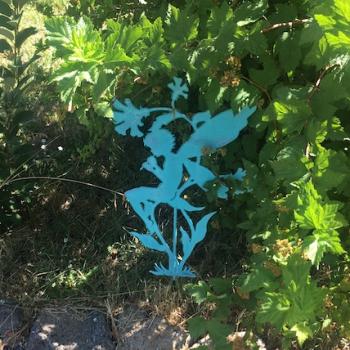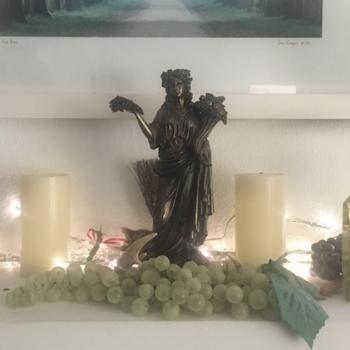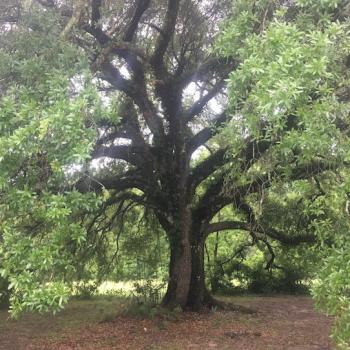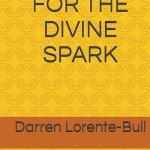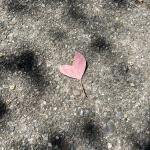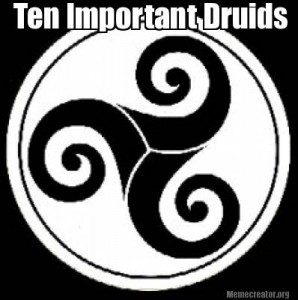 Last year I put together a few articles spotlighting the 25 Most Influential People in the Development of Modern Paganism. It was fun and was read by a lot of folks and even resulted in a few other similar lists, most notably a 25 person Canadian list and 13 influential figures in Goddess Spirituality. The original articles inspired a lot of comments too, mostly along the lines of “I can’t believe Person Y didn’t make your list!” Usually those criticisms were spot-on, I picked twenty-five folks but a credible case could be made for lots of people I left off my initial list.
Last year I put together a few articles spotlighting the 25 Most Influential People in the Development of Modern Paganism. It was fun and was read by a lot of folks and even resulted in a few other similar lists, most notably a 25 person Canadian list and 13 influential figures in Goddess Spirituality. The original articles inspired a lot of comments too, mostly along the lines of “I can’t believe Person Y didn’t make your list!” Usually those criticisms were spot-on, I picked twenty-five folks but a credible case could be made for lots of people I left off my initial list.
In order to fill in some of the gaps from that earlier project, and because I really like history, I’m running a feature over the next few weeks called “Ten Important ______.” This time around it’s Druids, and there’s one on Traditional Witchcraft already waiting to be read as well. Future installments will look at folks involved in Heathenry and Goddess Spirituality, and possibly more! Other than the time involved in writhing these things (longer than an average blog post) and the extra work of tracking down pictures and inserting links (takes forever!) these lists are fun.
Modern Druidry has re-emerged in the last 100 years due to a variety of circumstances. The Nineteenth and early Twentieth Centuries saw a huge upswing in the idea of Druids as a Fraternal Order along the lines of Freemasonry. Eventually members of some of those fraternal groups became more spiritual in outlook and began to try and recreate ancient Druidry. In the United States The Reformed Druids of North America began as a protest against a rule requiring all students at Carleton College to attend religious services. Like the fraternal orders some members grew interested in Druidism as a spiritual path and soon the RDNA had groves springing up across the country. A lot of Modern Druids are a part of larger organizations while others practice quietly on their own. No matter how or who they practice with, Neo-Druids are a vital and important part of the Modern Pagan landscape.
This list is presented in alphabetical order, placement is not indicative of any sort of ranking. Please remember this is all in fun and designed to simply draw attention to some important figures from our shared past and present. This list is not called “The Only 10 Important Druids” nor am I implying such a thing. These are just some figures I find interesting and/or influential. There are dozens more who are worthy of being on a list such as this and if you are of the opinion that I’ve missed someone share that person’s story in the comments section below or write your own list! I’m also not writing complete biographies here. So go easy on me all right? And as always, any list such as this is going to be reflective of the author’s biases . . . . . . .
 John Beckett John might not like being on this list, but it’s too late to turn back now! Due to the popularity of his blog Under the Ancient Oaks John Beckett is likely one of the most read Druids on the internet. In an online-sea of rancor, hurt feelings, and negativity Beckett is a powerful and rational voice. His high level of involvement in the online Pagan Community, the Unitarian Universalist Church and the Order of Bards, Ovates and Druids has made him an important contributor to both inter and intrafaith work.
John Beckett John might not like being on this list, but it’s too late to turn back now! Due to the popularity of his blog Under the Ancient Oaks John Beckett is likely one of the most read Druids on the internet. In an online-sea of rancor, hurt feelings, and negativity Beckett is a powerful and rational voice. His high level of involvement in the online Pagan Community, the Unitarian Universalist Church and the Order of Bards, Ovates and Druids has made him an important contributor to both inter and intrafaith work.
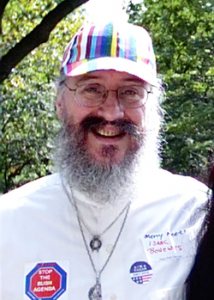 Isaac Bonewits (1949-2010) Issac is the only person who is on this list and my original Top 25 and if I could I’d put him on several more lists just because I think he’s that important. Not only did Isaac found Ár nDraíocht Féin, he served as its first and longest-tenured Arch-Druid creating an infrastructure that’s still in place today. Isaac’s massive influence on Modern Paganism isn’t just limited to ADF either. His 1972 book Real Magic was one of the first great modern occult books written by an American and he was involved in various other magickal and Pagan traditions including Witchcraft and Anton LaVey’s Church of Satan (at the tender young age of 18!). Bonewits continued to write until his untimely death in 2010 after a long battle with cancer. Isaac was also a singer-songwriter, a magazine editor, and one of the most fascinating Pagan speakers I’ve ever had the privilege of listening to. What is remembered lives.
Isaac Bonewits (1949-2010) Issac is the only person who is on this list and my original Top 25 and if I could I’d put him on several more lists just because I think he’s that important. Not only did Isaac found Ár nDraíocht Féin, he served as its first and longest-tenured Arch-Druid creating an infrastructure that’s still in place today. Isaac’s massive influence on Modern Paganism isn’t just limited to ADF either. His 1972 book Real Magic was one of the first great modern occult books written by an American and he was involved in various other magickal and Pagan traditions including Witchcraft and Anton LaVey’s Church of Satan (at the tender young age of 18!). Bonewits continued to write until his untimely death in 2010 after a long battle with cancer. Isaac was also a singer-songwriter, a magazine editor, and one of the most fascinating Pagan speakers I’ve ever had the privilege of listening to. What is remembered lives.
 Philip Carr-Gomm Philip Carr-Gomm has become one of the most influential Druids and Pagans in the world today, and he’s done it all with a gentlemanly touch, top-notch organizational skills, and a scholarly attention to detail. After becoming the Chosen Chief of the Order of Bards, Ovates and Druids in 1989 he turned the group into (arguably) the largest Druid organization in the world. His influence is not limited to OBOD either, Carr-Gomm has been a prolific author over the last three decades writing about Druidry and Paganism for large publishers such as Harper Collins and Random House. I know him best due to works like The Book of English Magic and A History of Nakedness which both mix scholarly research alongside pure readability (always much harder than it sounds).
Philip Carr-Gomm Philip Carr-Gomm has become one of the most influential Druids and Pagans in the world today, and he’s done it all with a gentlemanly touch, top-notch organizational skills, and a scholarly attention to detail. After becoming the Chosen Chief of the Order of Bards, Ovates and Druids in 1989 he turned the group into (arguably) the largest Druid organization in the world. His influence is not limited to OBOD either, Carr-Gomm has been a prolific author over the last three decades writing about Druidry and Paganism for large publishers such as Harper Collins and Random House. I know him best due to works like The Book of English Magic and A History of Nakedness which both mix scholarly research alongside pure readability (always much harder than it sounds).
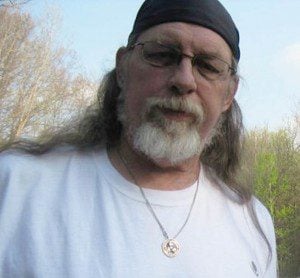 Ian Corrigan Though Ian doesn’t know it, he’s been a huge influence on me personally as a Pagan. As a member of the Chameleon Club he’s been one of the chief organizers of the Starwood Festival for the past thirty years (for many years the largest Pagan gathering in the Eastern half of the United States) all while maintaining a high level of involvement with ADF, even serving as their Arch-Druid for a short period of time. Ian’s reach is greater than most people know, and everyone reading this has most likely chanted his words during ritual. Hoof and horn, hoof and horn, all that dies shall be reborn. Corn and grain, corn and grain, all that falls shall raise again . . . . those lyrics are Ian’s. Corrigan is also a prolific author, a born story-teller, and one of the most knowledgable folks I’ve ever chatted with about Western Occultism.
Ian Corrigan Though Ian doesn’t know it, he’s been a huge influence on me personally as a Pagan. As a member of the Chameleon Club he’s been one of the chief organizers of the Starwood Festival for the past thirty years (for many years the largest Pagan gathering in the Eastern half of the United States) all while maintaining a high level of involvement with ADF, even serving as their Arch-Druid for a short period of time. Ian’s reach is greater than most people know, and everyone reading this has most likely chanted his words during ritual. Hoof and horn, hoof and horn, all that dies shall be reborn. Corn and grain, corn and grain, all that falls shall raise again . . . . those lyrics are Ian’s. Corrigan is also a prolific author, a born story-teller, and one of the most knowledgable folks I’ve ever chatted with about Western Occultism.
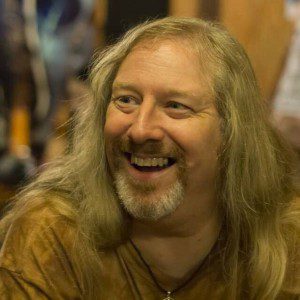 Damh the Bard I’ll never praise a musician or song-writer simply because they are Pagan, but when they are good at what they do and are Pagan I’m most likely a fan. Damh the Bard (Mr. Bard?) is damn good; he’s got a great voice, serious writing and playing chops, and puts together some truly infectious melodies. Damh isn’t just a singer either, he leads workshops and rituals (literally) all over the world and is a poet, podcaster, and blogger. I had the privilege of sharing a stage with him for a panel discussion and Damh impressed with his wit and wisdom. He’s a great ambassador not only for OBOD but also for both Druidry and Modern Paganism.
Damh the Bard I’ll never praise a musician or song-writer simply because they are Pagan, but when they are good at what they do and are Pagan I’m most likely a fan. Damh the Bard (Mr. Bard?) is damn good; he’s got a great voice, serious writing and playing chops, and puts together some truly infectious melodies. Damh isn’t just a singer either, he leads workshops and rituals (literally) all over the world and is a poet, podcaster, and blogger. I had the privilege of sharing a stage with him for a panel discussion and Damh impressed with his wit and wisdom. He’s a great ambassador not only for OBOD but also for both Druidry and Modern Paganism.
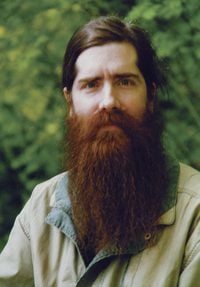 John Michael Greer For many years one of the mantras of PantheaCon was “No, I’m going to go listen to John Michael Greer, I never miss one of his workshops.” Greer is not only the current Grand Archdruid of the Ancient Order of Druids in America he’s also a best-selling “New Age/Metaphysical” author, an environmentalist, philosopher, and fiction writer. For years I really only knew Greer due to his many books sort of outside the Pagan genre, most notably his books on Cryptids, UFO’s, and Atlantis (all hobbies of mine), but he’s written extensively on Modern Druidry and the Western Magical Tradition. If that wasn’t enough he’s written seriously about the end of peak-oil and the future of the political process in the United States. He also most likely has the best beard of anyone on this list.
John Michael Greer For many years one of the mantras of PantheaCon was “No, I’m going to go listen to John Michael Greer, I never miss one of his workshops.” Greer is not only the current Grand Archdruid of the Ancient Order of Druids in America he’s also a best-selling “New Age/Metaphysical” author, an environmentalist, philosopher, and fiction writer. For years I really only knew Greer due to his many books sort of outside the Pagan genre, most notably his books on Cryptids, UFO’s, and Atlantis (all hobbies of mine), but he’s written extensively on Modern Druidry and the Western Magical Tradition. If that wasn’t enough he’s written seriously about the end of peak-oil and the future of the political process in the United States. He also most likely has the best beard of anyone on this list.
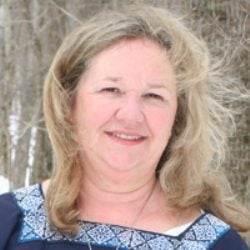 Ellen Evert Hopman In 1996 I picked up Hopman’s People of the Earth (later retitled Being a Pagan: Druids, Wiccans, and Witches Today) which I think I praised as the Drawing Down the Moon of the 90’s when it was released. Being a Pagan is one of the great overviews of Modern Pagandom, featuring interviews with Pagans from nearly every tradition under the sun. It’s still on my “everyone should read” list due to the sheer amount of diversity found within its pages. If that was all Hopman had ever done for Paganism she might still be on this list, but it’s just a start. Hopman has written extensively on herbalism and on Druid and Celtic lore in both fiction and non-fiction books. She also teaches a whole host of workshops and has been on several cable television shows dealing with Druidism.
Ellen Evert Hopman In 1996 I picked up Hopman’s People of the Earth (later retitled Being a Pagan: Druids, Wiccans, and Witches Today) which I think I praised as the Drawing Down the Moon of the 90’s when it was released. Being a Pagan is one of the great overviews of Modern Pagandom, featuring interviews with Pagans from nearly every tradition under the sun. It’s still on my “everyone should read” list due to the sheer amount of diversity found within its pages. If that was all Hopman had ever done for Paganism she might still be on this list, but it’s just a start. Hopman has written extensively on herbalism and on Druid and Celtic lore in both fiction and non-fiction books. She also teaches a whole host of workshops and has been on several cable television shows dealing with Druidism.
 Ross Nichols (1902-1975) When I put together that top 25 list last year the hardest name to leave off was Ross Nichols. For those unfamiliar with Nichols he’s the Father of Modern Drudiry, and a hugely influential Pagan in general. Nichols was active in The Druid Order, one of the first fraternal Druid organizations to openly mix elements of paganism and spirituality in their rites. While a member of the Druid Order Nichols was a friend of Gerald Gardner’s, and even used a sword borrowed from a member of Gardner’s coven for several years at Midsummer. Most likely there’s a lot more to the story of Nichols and Gardner and their influences upon each other. After leaving The Druid Order Nichols went on to found the Order of Bards, Ovates and Druids in 1964. OBOD was the first explicitly Pagan Druid group of the Modern Era and the longest lasting. His Book of Druidry was released fifteen years after his death in 1990, exposing Nichols’ vision to a new generation of Pagans and Druids.
Ross Nichols (1902-1975) When I put together that top 25 list last year the hardest name to leave off was Ross Nichols. For those unfamiliar with Nichols he’s the Father of Modern Drudiry, and a hugely influential Pagan in general. Nichols was active in The Druid Order, one of the first fraternal Druid organizations to openly mix elements of paganism and spirituality in their rites. While a member of the Druid Order Nichols was a friend of Gerald Gardner’s, and even used a sword borrowed from a member of Gardner’s coven for several years at Midsummer. Most likely there’s a lot more to the story of Nichols and Gardner and their influences upon each other. After leaving The Druid Order Nichols went on to found the Order of Bards, Ovates and Druids in 1964. OBOD was the first explicitly Pagan Druid group of the Modern Era and the longest lasting. His Book of Druidry was released fifteen years after his death in 1990, exposing Nichols’ vision to a new generation of Pagans and Druids.
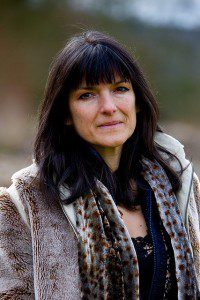 Emma Restall Orr Orr has been a part of many different Druid organizations since the 1980’s. She was originally a member of OBOD and then went on to a leadership position in the British Druid Order. In 2003 she founded The Druid Network to help facilitate communications amongst Druids and others with similar spiritual ideas. In addition to her past group work she’s also written several books on Druidry and is currently active in the natural burial movement.
Emma Restall Orr Orr has been a part of many different Druid organizations since the 1980’s. She was originally a member of OBOD and then went on to a leadership position in the British Druid Order. In 2003 she founded The Druid Network to help facilitate communications amongst Druids and others with similar spiritual ideas. In addition to her past group work she’s also written several books on Druidry and is currently active in the natural burial movement.
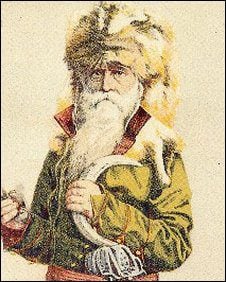 William Price (1800-1893) William Price might arguably be the first modern “Neo-Druid.” To Price Druidism wasn’t a just fraternal order it was both a matter of Welsh pride and a spiritual calling. He was also a vegetarian and believed that marriage enslaved women, he was an advocate of free love in Victorian England. He supported efforts to legalize cremation in Great Britain and his own cremation ceremony was attended by over 20,000 individuals. Much of the “religion” behind Price’s version of Druidry has been lost to history (it wasn’t all written down) but his bravery and eccentric nature are still an inspiration to many Modern Druids and Pagans.
William Price (1800-1893) William Price might arguably be the first modern “Neo-Druid.” To Price Druidism wasn’t a just fraternal order it was both a matter of Welsh pride and a spiritual calling. He was also a vegetarian and believed that marriage enslaved women, he was an advocate of free love in Victorian England. He supported efforts to legalize cremation in Great Britain and his own cremation ceremony was attended by over 20,000 individuals. Much of the “religion” behind Price’s version of Druidry has been lost to history (it wasn’t all written down) but his bravery and eccentric nature are still an inspiration to many Modern Druids and Pagans.
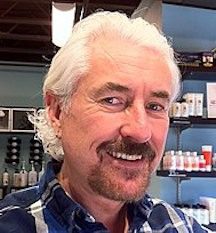 Kirk Thomas Kirk Thomas is one of the most impressive individuals I’ve ever come across in Pagandom. He conducts himself with class and is a credit to ADF, where he serves as Arch Druid. (I actually got to watch his instillation ceremony a few years ago, Druids know how to do ritual.) In addition to being the current leader of ADF Kirk is an amazing workshop facilitator and has been active on the Pagan festival circuit the last couple of years. He’s also active in prison ministry. If you ever get a chance to see Kirk make sure you take it.
Kirk Thomas Kirk Thomas is one of the most impressive individuals I’ve ever come across in Pagandom. He conducts himself with class and is a credit to ADF, where he serves as Arch Druid. (I actually got to watch his instillation ceremony a few years ago, Druids know how to do ritual.) In addition to being the current leader of ADF Kirk is an amazing workshop facilitator and has been active on the Pagan festival circuit the last couple of years. He’s also active in prison ministry. If you ever get a chance to see Kirk make sure you take it.


